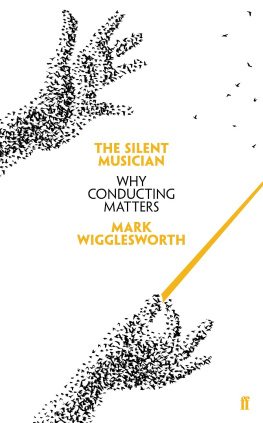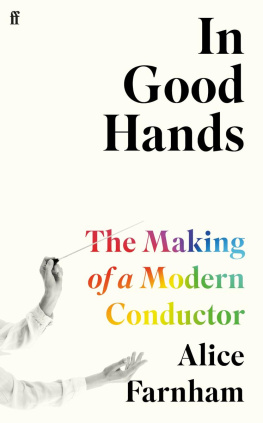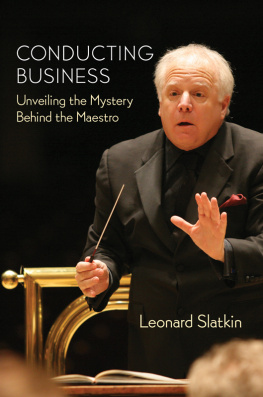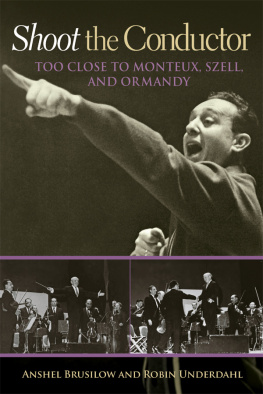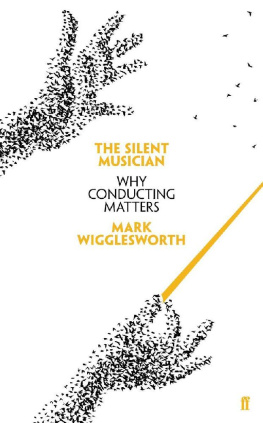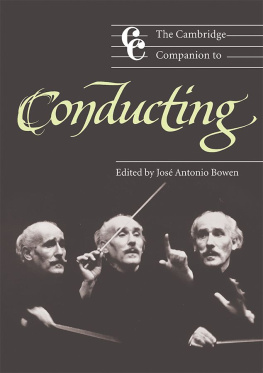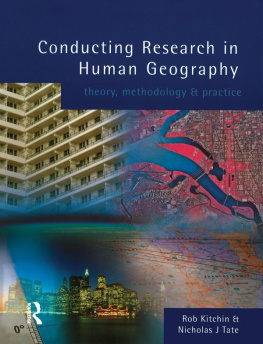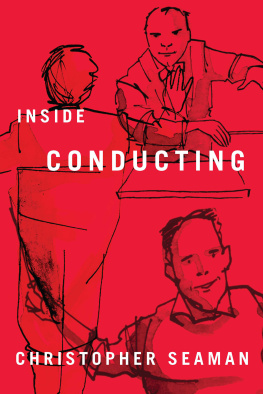
for Annemieke,
who understands what a conductor does,
and for Clara,
who one day might like to know too.
Time.
There is no force more powerful.
It waits for no one, cares for nothing.
We cannot control it. We cannot influence it. We can never be free from its irrevocable journey, nor deny its relentless passage. Sometimes even clocks do not keep up with it.
But we can control our perception of time.
Through music we can experience an hour as if it were a minute or a minute as if it were an hour. Music gives us the power to live in the present. There is no past on which to reflect. No future on which to dream. Music releases the present from the weight of its past and the expectations of its future. Such separation can bring profound relief.
All musicians have the privilege of playing with time. But for conductors time is our most significant responsibility, weaving pulses in and out of its unwavering path, generating a more forgiving vision of its inevitable tread. We seek to organise music within time while simultaneously releasing it from the restrictions time imposes. We work within the boundaries of this paradox, managing the ebb and flow of music to defy a ticking clock and inspire a pulsing heart.
We beat time.
We shape the invisible.
Music is the art of sounds in the movement of time.
Ferruccio Busoni
A conductor is one of classical musics most recognisable figures. Many people who have never been to an orchestral concert will have an image of what one looks like. Yet even for music lovers the role can be a dubious one, mysterious at best. The confusion is understandable. Within a context that is essentially only about sound, there is something surprising about the significance given to someone who remains completely silent. It is intriguing that an art form that is not supposed to be about what you see should so often be embodied by someone you cannot hear.
The comic stereotype of an indulged megalomaniac, whose self-importance doesnt seem to match what the orchestra musicians are doing, is a pervasive clich. The last person to enter the room, apparently possessed of a paranormal ability to determine precisely when the atmosphere is conducive to begin, proceeds to perform a series of exaggerated gestures that vaguely coincide with the energy of the music, conjuring up a cauldron of magical sounds with a wand-like stick, subsequently accepting the ensuing applause while simultaneously acknowledging with self-proclaimed humility and sheepish demur both the music and the people who played it, exiting the stage with a profound tread that informs us exactly how much we have all been moved by the power of the breathtaking experience we have shared. Its easy to laugh at people who take themselves so seriously, especially if we think their work might be completely irrelevant.
However, I dont think the profession would exist if it was unnecessary. In fact, conductors are in a position to influence the musical lives of many classical music lovers, both in the orchestra and in the audience, to a significant degree. Whether we do or not, of course, depends on how good we are at our job.
Rarely does such a well-known profession attract so many questions: Surely orchestras can play perfectly well without you? Do you really make any difference to the performance? Are the musicians actually watching you? Some of these even come from orchestra players themselves! Yet though any human relationship is based on untold complex, subconscious, and often inexplicable forces, and the dynamic between an individual and a group is rarely simple, the role of a conductor I believe is no great mystery.
People wonder less about leadership in other occupations. I doubt if many theatre directors, sports coaches, or frankly anyone whose success depends on an ability to empower others, generate quite as much puzzlement. Is it the greater familiarity with drama, sport, or business that makes it easier to appreciate why a cast of actors has someone in charge, why eleven individuals dont necessarily make a team, or why companies profit from being inspired by someone who is free to focus on the overview? A good conductor unifies and inspires a large group of people for exactly the same set of reasons that any other leader does. Retaining ones own responsibility for decision-making while creating a rewarding collective sense of collaboration might not be an exact science, but few would disagree that such a combination is the goal of contemporary leadership in pretty much any field.
A conductor is one of the few people whose authority is exercised in public. Although you would think that the highly visible nature of the role might make it easier to understand than the work of someone behind the scenes, the opposite seems to be the case. It is clearly the sight of the conductor that creates the confusion. Conductors are more hands on than most leaders. The complication is that the language we use is figurative, and our mode of communication can appear questionable to an audience that is probably not meant to see it at work at all. Its hard for the public in a concert hall to avoid observing the physicality of a conductor, but our gestures are no more a means to an end than is an instrumentalists fingering. Im not sure it should matter to the listener what a conductor looks like yet everything about the visual mechanics of a live orchestral concert seems to suggest that it does.
A three-year-old I used to know always referred to me as The Connector. Like many malapropisms, her delightful slip of the tongue reveals a lot. Conducting is all about connecting. You try to connect the composer to the musicians to the music to the audience, and hope that by strengthening these links you are a conductor in the scientific sense of the term a body that transmits heat, electricity, or sound. And away from a scientific context, the most common non-musical meaning of the verb to conduct is well understood. An usher conducting you to your seat will most likely walk alongside you, probably just a shade in front, but as much accompanying you as leading you. And the amount of guidance you receive will depend as much on you as on the person who is conducting you. The usher is undoubtedly in charge, but not by much. Leading with is an etymological as well as a musical definition of conducting, for though musical performances must have a clear sense of direction, an orchestra is a body of musicians that needs to be empowered to express itself. Managing a broad coalition that still has a distinct vision as its aim might appear a contradiction to some, but the best conductors achieve precisely this combination without any artistic compromise. Good leaders dont just shout commands and expect them to be followed, and successful teams in any environment are as much about the individuality of its members as they are about discipline. This is particularly true for an orchestra whose players have to be able to take ownership of the performance if it is to sound credible to those who are listening.
My earliest memory of a conductor is a televised performance of Mahlers gigantic Eighth Symphony. I watched the first few bars, went off to play outside, and returned just in time for the very end, witnessing the figure on the podium completely transformed from an hour or so before. There might not have been any blood, but a considerable amount of sweat, blurred with the occasional salty tear, exuded a heady cocktail of physical and emotional exhaustion, and made me realise that although Id missed the journey, all those involved in it had travelled a significantly long way. As a seven- or eight-year-old, I was far too young to articulate any more than that, but the need for orchestral music to be coaxed and controlled, driven and steered, is one of the reasons it is a good idea to have one individual in charge. Musicians are perfectly capable of doing these things on their own, of course, but with large groups it is almost impossible to reach a unanimous opinion about the detailed route the music should take. A conductors responsibility is to create such unanimity to make sure that every player is able to be part of the same performance.

